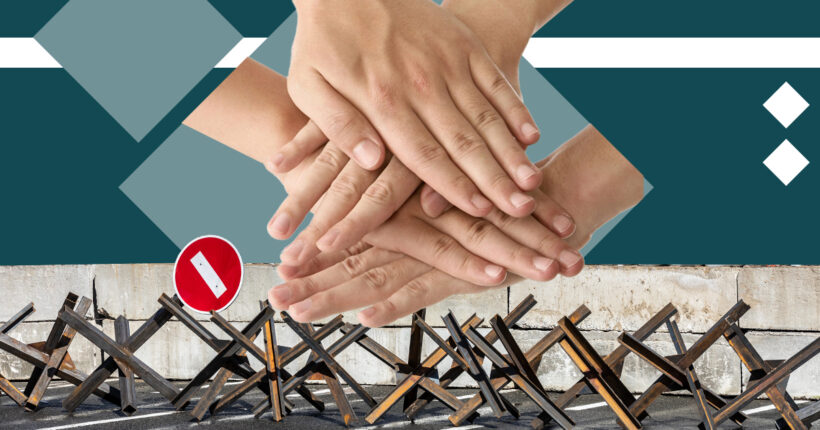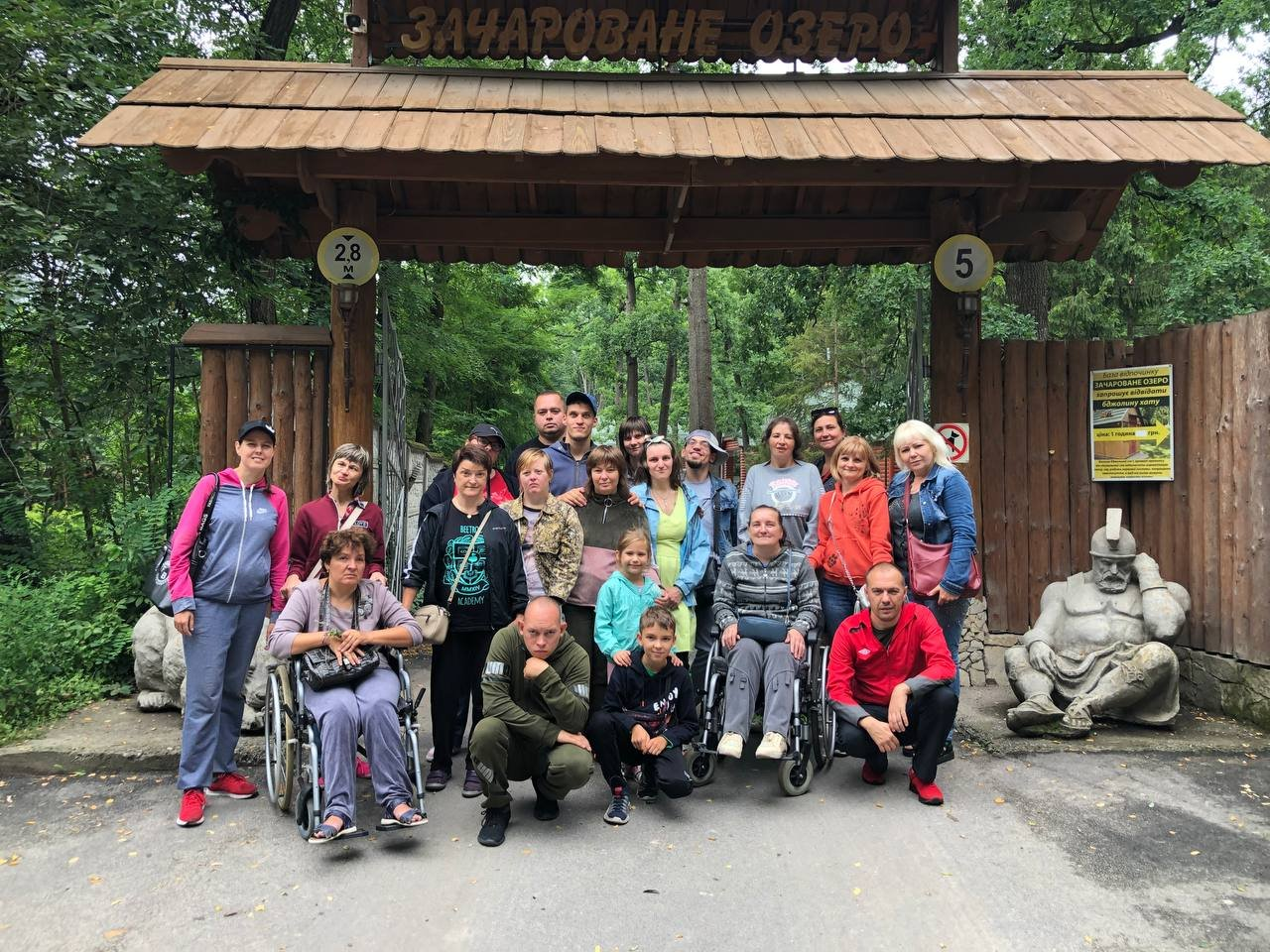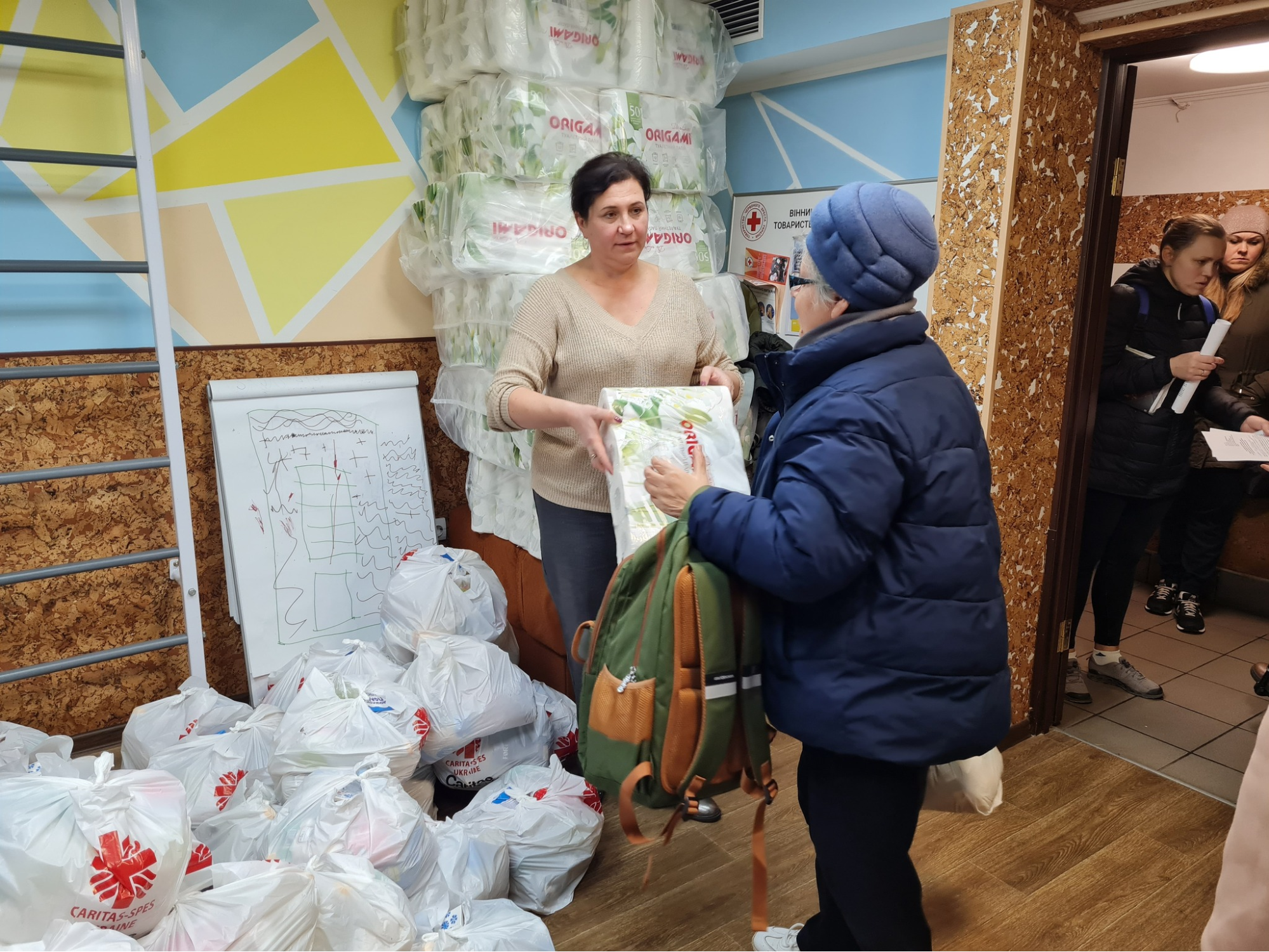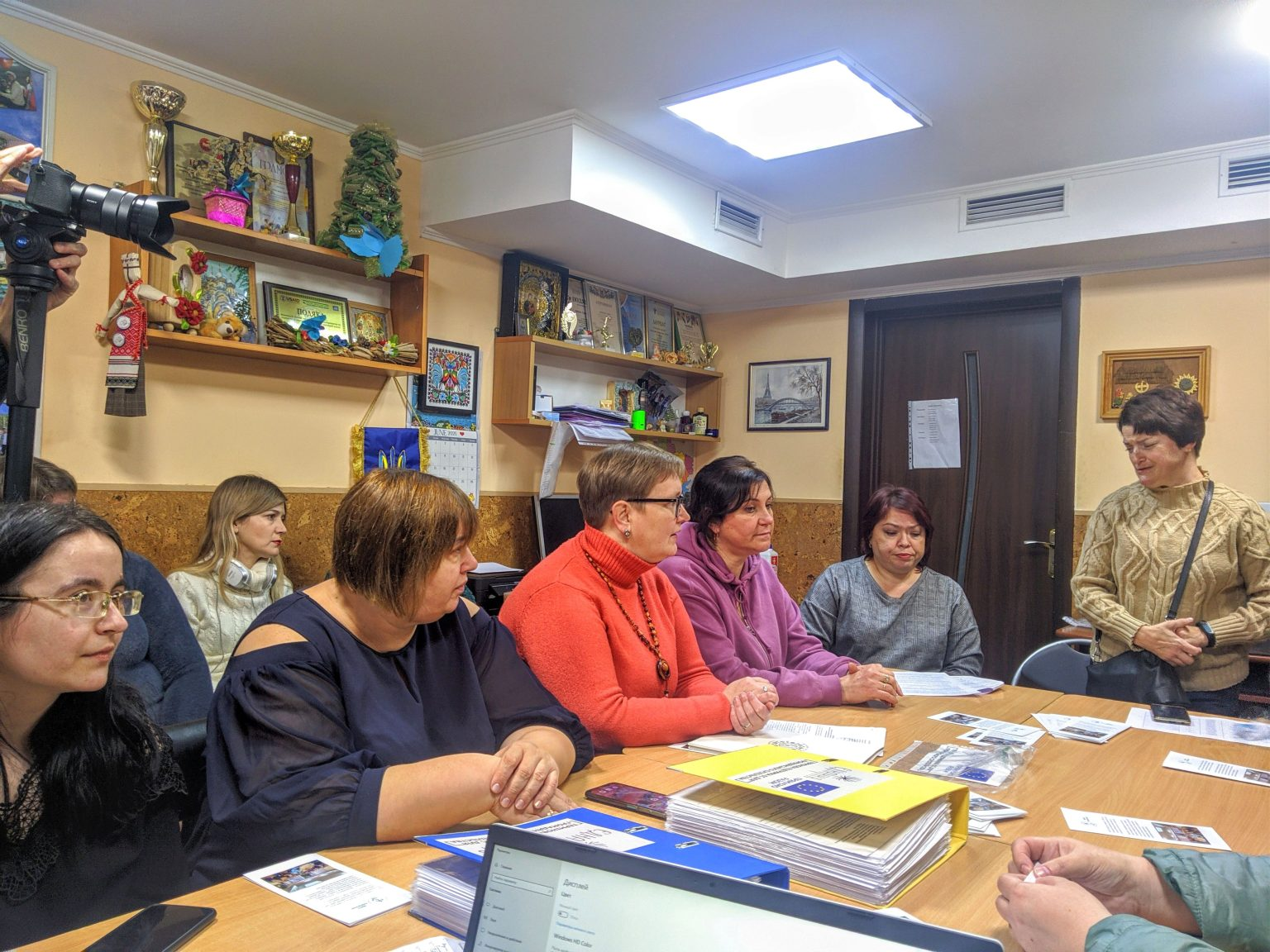
What is the problem?
Before February 2022, most public organizations had clear plans for the year. But everything changed with the start of russia's full-scale war. Shock, NGO workers evacuating to other regions and countries, and deaths, injuries, destruction, and worsening of diseases due to stress undermined public organizations' work and significantly affected NGOs working with people with disabilities.
What is the solution?
Only some public organizations were immediately able to adapt to wartime conditions. Some, finding themselves in a state of confusion, temporarily stopped all activity. Among those who managed to restructure their public organization, work effectively with a team and volunteers, and find new funding sources is the NGO Vinnytsia City Organization for Social Development and Formation of Individual Underprivileged Categories of Youth, Parostok (means "sprout"). Today Parostok not only continues to work with vulnerable segments of the population but also helps colleagues find the strength to work in difficult conditions, adapt to new challenges and make the work of NGOs more effective.
How does it work?
The Parostok non-governmental organization has more than 20-year history. In the late 1990s, NGOs were created to protect the social, economic, and other common interests of people with disabilities, people living with HIV/AIDS, cancer patients, and different socially vulnerable categories of youth and adults. Parostok was called to create the conditions for full self-realization and societal adaptation for them.

Thus, the NGO Parostok helped people with disabilities in social, labor, and medical rehabilitation, promoted their professional self-determination, independent living, and job search, and advised and arranged sports and entertainment events. All this was possible with the help of international organizations and local authorities. But with the beginning of a full-scale war, working conditions naturally changed.
"During the war, we faced many challenges," says the Parastok chief, Iryna Sarancha. "In particular, we needed to reformat the projects we implemented before the full-scale war, focus on the needs of that time, and organize the departure of part of the team abroad. With the beginning of the war, the organization lost the understanding of what the next step should be. Social programs were closed at the local level. Constant air raid warnings, power outages, and high anxiety of clients who needed constant attention, also did not add stability to our activity."
With the beginning of full-scale кussian aggression, millions of people were forced to leave their homes. Many displaced people, including those with disabilities, found refuge in Vinnytsia. Although the organization already had experience working with people with disabilities who have had IDP status since 2014, the vast number of newly displaced people also became quite a challenge for Parostok because more and more people who arrived to the city learned about the organization.
Humanitarian hub for displaced persons
Having recovered from the initial shock, the NGO paid considerable attention to the humanitarian needs of displaced persons in the first weeks of the war. At first, they helped as much as possible and then came up with the idea of creating a humanitarian hub for IDPs with disabilities.
"We saw the real needs of people, and this became an incentive for work. Our clients needed our support even more, which gave us the strength to move forward," Iryna Sarancha recalls.

Realizing the importance of this direction, the NGO opened Vinnytsia Community Humanitarian Hub for IDPs with Disabilities in Vinnytsia in November. It was created within the Urgent EU Support For Civil Society project. Here, people with disabilities are helped to adapt to a new place, adjust their daily life, and solve urgent problems. In addition to individual consultations, the hub organizes art therapy classes for families of IDPs with disabilities and developmental classes for children. Of course, they remember the sets of food, hygiene, and clothes. More than 200 people can receive humanitarian aid, which Parostok employees distribute, in the hub in one day! As the head of the NGO, Iryna Sarancha, says, motivation helps the Parostok team, and her personally cope with the massive volume of work and feel like citizens of Ukraine.
"The days are sometimes too diligent. The problems that existed in peaceful times have become more urgent, requiring more attention. Thanks to everyone who knows how to care and think about others, even in difficult situations. We also thank our clients who treated us with understanding, everyone who hugged us, who showered us with words of support and good wishes until late at night," says the NGO Parostok.
But when Parostok saw that public organizations could remain effective even during the war, they decided to share the acquired experience with others. This is how a new project appeared. This time, it is an educational one.
How to stay effective?

The Ukraine Rapid Response Fund IREX or URRF's trust helped the NGO Parostok regroup and "get on new tracks." After all, the URRF supported the first project of Vinnytsia residents during the full-scale war. The project, called "Ways of the response of the public sector to social and humanitarian crises," was founded by Parostok on its own experience. Iryna Saracha shares that the goal set in the organization was to help other NGOs of Ukraine reform and continue their work in wartime conditions.
Thus, the NGO developed an online educational course with sign language translation within this project. For three months, 196 representatives of public organizations — specialists, participants, volunteers, and managers — registered for free online training on the Learn Accessibly online training platform. Among the students of the course were people with disabilities, parents raising children with disabilities, displaced people, students, and the elderly. Parostok recorded video lectures, gave homework and additional materials, mentored public activists, and thus helped organizations from all over Ukraine to start new lines of work and provide high-quality social services even during the war. Most of all, the project team shared tools and techniques for managing the emotional state, preventing burnout, transitioning to adaptation, and making effective decisions in a period of uncertainty in the developed electronic Memos on improving the psycho-emotional condition and continuing the work of NGO representatives with disabilities during the war.
During the project, Parostok received many applications requesting to allow the NGOs that do not work with people with disabilities but would also like to participate and learn to find the strength and motivation to continue their work. They were accepted. Moreover, now those organizations that do not work specifically with people with disabilities have learned to build their work more inclusively and, therefore, to make Ukraine more inclusive. The NGO Parostok taught more than 100,000 activists across the country.

Parostok's mentoring support might have been the most crucial element in training. So, Olena Sikora from another Vinnytsia public organization, Social Inclusion, says that after completing the course and thanks to the mentoring, she was again able to see the path of the NGO and make a plan for further action.
With the beginning of a full-scale war, many members and clients of the organization left for other countries, and Olena and her children evacuated to Poland. Although the woman maintained contact with colleagues, she did not understand how to organize the work and help the organization from abroad. It was mentoring sessions and consultations that helped to find a new way. The future no longer seemed so bleak.
"There was a clear realization that it was necessary to calm down and move on. The inclusion issues will never be fully resolved, but that does not mean we should ever stop this activity. You always have to find a way out and look for people who can tell you where the exit is," the social activist shared feedback from the training.
And Valentyna Kushnir, the head of the Lviv NGO Dyvosil — Zdorovia, was helped by the course to understand that even in crisis and unpredictable circumstances, it is still possible to interest people and encourage them to take active steps toward a healthy lifestyle.
"During the war, many aspects of ordinary life became inaccessible, or as they say, 'not timely.' One of these areas was the issue of health, healthy nutrition, active lifestyle, and sports. The problem of how to interest people and restore their desire to care for health in wartime emerged. While listening to the course, I always came up with new ideas. It helped me not despair but start over," Valentyna Kushnir shares.
Parostok is already planning to scale up its Ways of Response project and expand it with an inclusive component. Now, more than ever, it is essential for Ukraine's speedy reconstruction after victory.
"We want to involve NGO representatives with disabilities and NGOs that do not yet provide services to people with disabilities in training, joining their efforts and increasing their influence in promoting the values of non-discrimination and inclusion. This will help to develop and implement inclusive initiatives for the benefit of society to rebuild Ukraine as soon as possible after its victory in the war," says the head of the NGO, Iryna Sarancha.
Even more helpful solutions!

The team of any public organization can be effective even during prolonged stress, says Parostok. It takes time to implement changes for each person and team.
Ten steps that will help NGOs adapt to changes.
1️⃣ Crises the NGO has already experienced can help adapt to today's conditions. For example, the pandemic and quarantine restrictions have challenged many public organizations. Humanitarian crises during covid and full-scale war have one thing in common — uncertainty. Remembering what helped your public organization work in conditions of uncertainty during the pandemic is the first step to resuming full-fledged work. If you have remembered even a few words, then you already have support on which your public organization can rely.
2️⃣ You should consider the following: What is the most critical value for the organization? What makes you keep working? What principles will you not give up under any circumstances? To keep teams motivated, you need to remind yourself of your mission — it's what people came together for and worked together for. Awareness of the mission gives a person the strength to live in unfavorable conditions.
3️⃣ Remind yourself that public organizations influence change and that the concrete results of their work inspire and motivate. These concepts will help public organizations to understand the situation where they find themselves in:
- "circle of worries," which includes phenomena that we cannot influence — uncontrollable events, disasters, war, force majeure;
- "circle of influence" — things or phenomena a public organization can control. This is information distributed by the organization, decisions made by management and membership, projects, and events.
Teams of public organizations focused on a circle of worries can quickly lose the meaning of their work. Such teams are more likely to feel helpless during a crisis. Teams focused on the circle of influence actively develop even under unfavorable external circumstances.
4️⃣ Answer: What can a public organization do to prevent helplessness and start moving out of the "circle of worries" into the "circle of influence"? The "Ways of the response of the public sector to social and humanitarian crises" course advises you to focus on actions that are already under your control. This arrangement brings order to various activities of the public organization and step-by-step planning.
5️⃣ Relationships support a team with membership, donors, and partners in difficult times. During a crisis, relationships help in information exchange and provide support for the organization and its environment.
6️⃣ Remind yourself that periods of non-productivity do not mean you waste time. This is an excellent time to restore and accumulate resources. If you want to boost your and the team's energy, find something interesting and related to the mission and focus on it. Participation in professional training, communication with colleagues from other public organizations, new knowledge, and exciting forms of education can help here. All this can remind us about the organization's mission and form new exciting activities. Even the most minor actions that generate enthusiasm in the team will help reduce the impact of stress.
7️⃣ Beyond the reminder of mission and meaning, most people in crisis need space for exciting and helpful work, positive communication, and moral support. Even in crises, the team will work effectively if a public organization has such a space.
8️⃣ It is essential for NGOs to take care of clients but not to forget about themselves and restore their physical and psychological resources.
9️⃣ Many social programs have closed, but new programs have also appeared. That is why public organizations need to be in constant search of funding. And those NGOs that are just starting to work should not be afraid of defeat. Instead, they should know what their NGO is working for.
🔟 Helping other people is one of the best things to do in wartime. By helping others, public organizations help themselves at the same time. After all, during the war, they find spheres they can influence and control. Therefore, instead of feeling helpless, they acquire new knowledge and skills and develop and form effective behavior during a crisis, gaining skills and experience that they can use in the future.
You can find more helpful advice in the course "Ways of the response of the public sector to social and humanitarian crises." You can join on the website of the Parostok educational platform, Learn Accessibly, at the link.
The course is available for free.
In addition, on the organization's website, you can find two memos developed as part of the project for course participants:
- Regarding the improvement of the psycho-emotional state of CSO representatives with disabilities during the war
- And Regarding the continuation of the work of CSO representatives with disabilities during the war.
This article was created by the Rubryka online publication within the Ukraine Rapid Response Fund program, implemented by IREX with the support of the US State Department. The content is the sole responsibility of the Rubryka online publication and does not necessarily reflect the views of IREX or the US State Department.
Newsletter
Digest of the most interesting news: just about the main thing








